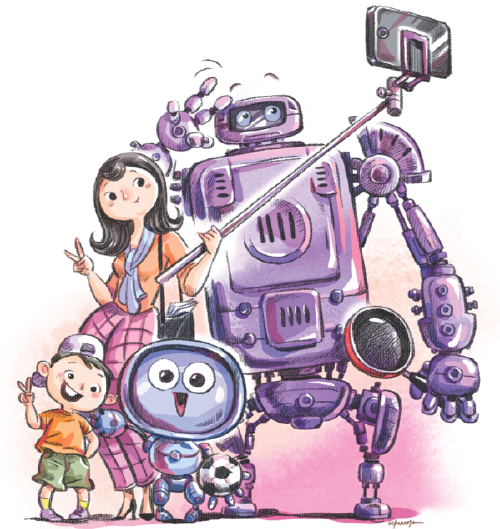AI raises profound philosophical questions
By Cai Fanghua (China Daily) Updated: 2016-03-12 09:41
 |
| LI MIN/CHINA DAILY |
Famous world Go player Lee Se-dol has lost the first two of his five-game match with AlphaGo, an artificial intelligence, or AI, program developed by Google, in Seoul. Since the South Korean Lee was supposed to be representing not only himself but also the human race as a whole, he knows the meaning of the defeat.
I carefully went through their first game's manual twice and was shocked by AlphaGo's exquisite algorithm, efficient computing power and its "personality" as a Go player. Despite being driven by artificial intelligence, AlphaGo has a transcendental view of the big picture and the ability to identify its opponent's weaknesses. It made up for its two mistakes soon, and was merciless in its attack on the "impregnable" zone Lee had created. But after taking the lead, AlphaGo's movements were unhurried despite continuing to pressure Lee.
People who don't know about Go may not understand why the match is so important. Go is an old strategic board game, and the result is decided not just by ingenious calculations, but also by the players' personalities, moods and feelings. From a Go player's manual, you can walk into his or her personal world. The accepted view before the game was that given the complications of Go, it was impossible for an AI program to win against humans. That has changed.
In a Go game between astute players, personal emotions could be a decisive factor. AlphaGo's coolness lies in its indifference to rivals; instead of testing the human characteristics of his rivals, it would rather demonstrate pure and conquering rationality.
In other words, in AlphaGo's world, emotions can be a piece of information that can be grasped through rigorous computing. The fear is, if AI develops to such a level, human nature could become a redundant program in a perfect world which could be deleted with just one click of a mouse. Doesn't The Matrix present this exact scenario?
It may be too emotional to jump to the conclusion that humans will be enslaved by artificial intelligence just on the basis of a couple of Go games. Yet AlphaGo's victory shows AI is progressing, and progressing fast, toward some forbidden zones in which humans have taken pride for long.
The question is: What else AI can do? Who can predict what changes it will bring to the human world? And to what extent can intelligence created by humans expand?
When a "Turing test" was first proposed to test the intelligence of robots by Alan Turing, a British mathematician and father of artificial intelligence, in the 1950s, computers were huge machines. Now, who would dare to call AlphaGo a simple machine?
I would rather take the discovery of gravitational waves and AlphaGo's two wins as an inter-related omen to say humans are on the threshold of new round of explosions in science and technology. The breakthrough in AI may trigger a chain reaction in many fields, and promote the exponential growth of science and technology. Many scenarios that appeared only in science fictions before would probably become reality. Such a prospect is excitingly fearful.
No doubt the intelligence created by humans will have its own thoughts and strengths in the future. But will it have emotions or something beyond? If so, how should we define human nature and ethics? This is a profound philosophical question. You can have countless answers, and each leads to a different future.
One day, your AlphaGo butler serves you breakfast when you wake up to a sunny morning. You could even have a date arranged by it. It could arrange for a spotless life while you are still in the dark. What is it? A nightmare!
The author is a senior writer with Beijing Youth Daily. The article was first published by the newspaper's WeChat account named talkpark.

I’ve lived in China for quite a considerable time including my graduate school years, travelled and worked in a few cities and still choose my destination taking into consideration the density of smog or PM2.5 particulate matter in the region.











